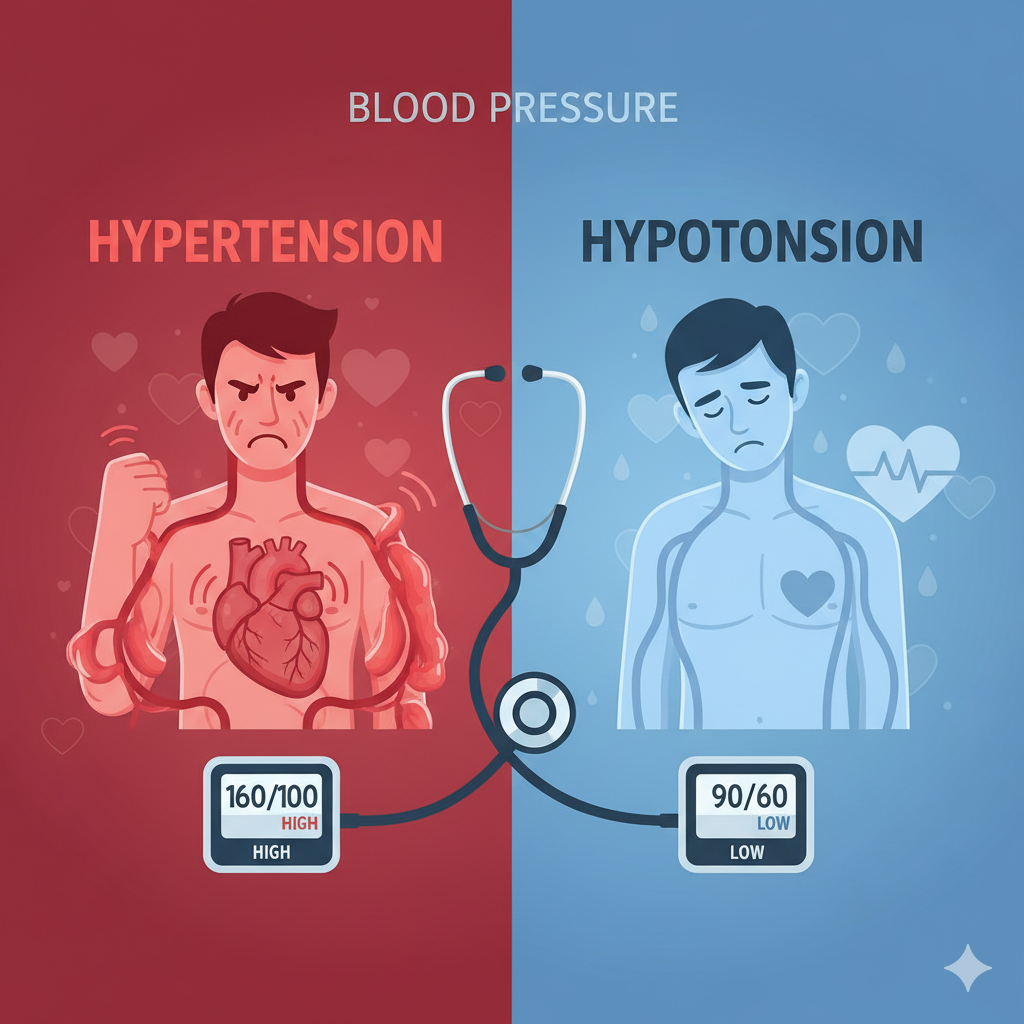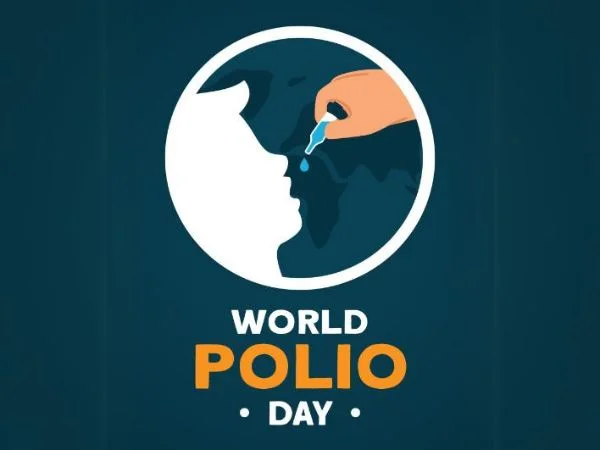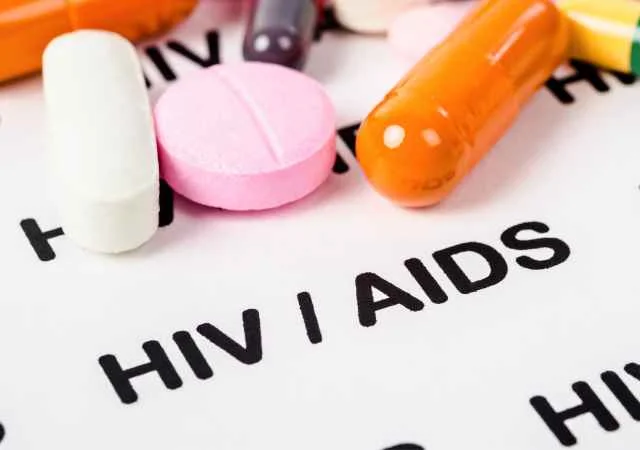Blood pressure plays a significant role in maintaining your body’s health, as it shows how hard your heart pumps blood through your arteries. Your body gets the oxygen and nutrients it needs when your blood pressure stays normal. But in certain conditions, when this becomes too high or too low, things could go wrong. That’s where the comparison of hypertension versus hypotension becomes really important. Hypertension means your blood is pushing too hard against the walls of your arteries, and hypotension means it’s not pushing hard enough. Contrary to their names, they both can be risky if not managed on time.

When people refer to high blood pressure as opposed to low, many assume that the former is the only one that is dangerous. The truth is, however, that both are capable of causing health issues, just in different ways. High BP can damage the heart and kidneys over time, whereas low BP brings a risk of sudden collapse and fainting.
The World Health Organization estimates that 1.28 billion adults have hypertension, but many people do not even know their status. Understanding these conditions early will help in the prevention of long-term harm and in keeping your heart strong.
Overview of Blood Pressure
Blood pressure is the force of your blood pushing against your artery walls. It’s measured in two numbers: systolic, the top number, showing how much pressure your blood creates when your heart beats, and diastolic, the bottom number, showing pressure when your heart rests between beats. A normal reading is about 120/80 mmHg.
The moment this balance goes off, your health starts to suffer. If your pressure is higher than normal for a very long period of time, it’s called hypertension or high blood pressure. If the pressure stays lower than normal, it is called hypotension, or low blood pressure. Understanding high blood pressure versus low blood pressure helps you know how both extremes affect your organs differently.
The human body requires consistent pressure with the aim of delivering oxygen and nutrients to every part. If blood pressure is too high, then extra strain is placed on the heart and arteries. If it’s too low, your brain and organs will starve of blood.
A study published by the American Heart Association Journal in 2023 showed that both high and low blood pressures increase the risk of heart-related problems, showing how important it is to keep your blood pressure within the normal range.
What is Hypertension or High Blood Pressure?
Hypertension is a condition where one’s blood pressure pushes too strongly against the walls of their arteries for an extended period. The pressure of your blood flow should usually be at 120/80 mmHg but is considered hypertension when it consistently goes above 140/90 mmHg.
It’s a condition that often develops silently-that’s why it is known as the “silent killer.” Most people with this condition do not have symptoms for many years. Over time, though, it can damage your heart, brain, and kidneys. Symptoms can include headaches, dizziness, or shortness of breath when they finally appear.
It is caused by too much salt intake, obesity, stress, lack of exercise, and genetic causes. Hypertension, if out of control, can eventually lead to heart attacks, stroke, or renal failure over time.
Hypertension, compared to hypotension, will generally cause more long-term damage since it affects the arteries and the health of your heart in silence over time.
According to the World Health Organization 2022 report, nearly a third of adults worldwide have high blood pressure, and only half are aware of it. Early diagnosis, medication, and changes in lifestyle can control it and reduce serious health risks.
What is hypotension?
Hypotension, or low blood pressure, is when your blood pressure becomes lower than normal, usually less than 90/60 mmHg. It is a condition wherein not enough blood circulation goes through your brain and heart, among other major organs, because the blood isn’t pushing hard enough against the artery walls.
Some of the more common causes are dehydration, missing meals, rising quickly from a seated or lying position, some heart problems, and side effects of medicines. A few people naturally have low blood pressure and feel fine. However, low blood pressure can also cause worrying symptoms: dizziness, blurred vision, tiredness, fainting, or confusion.
Unlike high blood pressure, which takes a gradual approach to organ damage, low blood pressure might cause sudden episodes of, for example, fainting or even shock in cases of too low blood flow to the brain or heart. That is why understanding high blood pressure versus low blood pressure is important, as both can harm your body in different ways.
If severe and left unattended, hypotension may become lethal because it can cause the failure of organs. According to the BMJ, 2021, individuals with very low blood pressure face an increased risk of injury from fainting and even heart problems. Routine check-ups will keep your BP in a safe range and avoid sudden drops.
Comparing Hypertension vs Hypotension
When juxtaposing hypertension with hypotension, it becomes clear that each affects the heart and blood flow, but in opposite ways. Hypertension triggers high blood pressure wherein the heart works extra hard to pump blood through narrowed arteries. Hypotension means the blood does not reach the organs with enough force, and that may leave one feeling dizzy or weak.
Here is a simple comparison:
| Feature | Hypertension | Hypotension |
|---|---|---|
| Definition | High blood pressure above 140/90 mmHg | Low blood pressure below 90/60 mmHg |
| Short-term effect | Often no symptoms | Dizziness, fainting |
| Long-term risk | Heart attack, stroke, kidney damage | Falls, shock, organ failure |
| Nature | Chronic & silent | Sudden & visible symptoms |
Nature Chronic & silent Sudden & visible symptoms
In the debate of hypertension vs hypotension, high blood pressure is more dangerous over the long term, quietly damaging blood vessels and vital organs over many years. However, low blood pressure could be risky in the short term, especially if it leads a person to faint or significantly cuts the flow of blood.
It was demonstrated in a study by Harvard Health in 2022 that high and low BP pose a risk to heart complications; however, uncontrolled hypertension contributes to more deaths annually across the globe.
Which is More Dangerous? The Medical Verdict?
Though both hypertension and hypotension have the capacity to damage your health, they do so in very different ways. In terms of hypertension versus hypotension, many doctors view high blood pressure as more dangerous in the long term, though low blood pressure can be more dangerous in the short term.
Unattended hypertension causes silent damage to your arteries, heart, kidneys, and even your eyes for many years. It can cause heart attacks, strokes, and kidney failure-many times without warning. Since it develops slowly, many people are not aware of the damage until it is advanced.
Sudden hypotension may also cause symptoms such as fainting, confusion, or even shock if the blood flow to your brain or heart has fallen abruptly. If severe, hypotension can be life-threatening.
Therefore, in high blood pressure vs. low blood pressure, high BP is more dangerous since it may be responsible for millions of deaths globally every year. Low BP usually is manageable but needs attention when symptoms are intense.
A 2023 World Health Organization Global Health Report states that high blood pressure is responsible for more than 10 million deaths annually and represents one of the world’s leading silent killers.
Causes and Triggers – What Raises or Lowers Blood Pressure
Blood pressure never changes without a reason; it may be influenced by your lifestyle, emotions, and health conditions. Knowing what causes high blood pressure versus what causes low blood pressure helps you to take charge before any problem arises.
Common causes of hypertension or high blood pressure:
- Consuming excess salt or processed food
- Being inactive
- Smoking or consuming alcohol
- Anxiety and loss of sleep
- Family history or hormonal imbalance
Common causes of hypotension (low blood pressure):
- Inadequate fluid intake or dehydration
- Nutrient deficiencies or skipping meals
- Standing up too quickly (postural hypotension)
- Heart problems or certain medications
- Severe infection or blood loss
Hypertension builds up gradually with no noise, silently damaging your arteries. Generally, hypotension appears all of a sudden, often with dizziness, fatigue, or even fainting spells. Both can be brought about by poor diet, stress, or sudden body changes.
A 2022 study in the Journal of Human Hypertension found that irregular sleepers, highly stressed people, and those not drinking enough water have a bigger risk of both high and low blood pressure. It further describes how lifestyle balance-and not necessarily medication-is absolutely key when trying to maintain healthy blood pressure levels.
Managing Both Conditions
While managing hypertension involves trying to bring down the blood pressure, hypotension requires one to raise it to a safe level.
For Hypertension (High Blood Pressure)
- Eat less salt: Too much sodium raises blood pressure very rapidly.
- Exercise regularly: at least 30 minutes a day keeps your heart healthy.
- Maintain a healthy weight: Extra fat makes the heart work harder.
- Reduce stress: Practice meditation or deep breathing.
- Avoid smoking and alcohol.
For Hypotension (Low Blood Pressure)
- Drink more water: Dehydration drops BP much quicker.
- Add a bit more salt, if your doctor allows it.
- Take small, frequent meals: This will avoid sudden drops in BP.
- Avoid standing up too quickly.
- Wear compression stockings if advised by your doctor.
Despite various measures for treatment, both of these conditions demand periodic check-ups and a proper diet. In the debate of high blood pressure vs low blood pressure, lifestyle alterations can make a big difference for both.
A study from the European Heart Journal in 2023 found that those with heart-healthy diets, regular exercise, and controlled stress saw a reduction in blood pressure fluctuations by 40%-proof that simple daily habits can protect long-term heart health.
When to Seek Medical Care
Knowing when to get medical care is important, whether you have high or low blood pressure. Many people wait until symptoms occur, ignoring warning signs of an impending problem until they become an emergency.
Seek immediate medical attention if you experience any of the following:
- Fainting, dizziness, or confusion
- Chest pain or shortness of breath
- Blurred vision, or a severe headache
- Irregular heartbeat or sudden weakness
These could mean your blood pressure is either too high or too low. The common question many individuals ask is, Can low blood pressure cause death? Yes, in rare but critical instances, if blood flow to the vital organs such as the brain or heart suddenly decreases, it may lead to the failure of an organ or even shock. That is why it should never be ignored when one is suffering from low BP, especially on frequent occasions.
Similarly, uncontrolled hypertension can quietly destroy your arteries over the years and can result in a heart attack or stroke. Regular check-ups, medications, and home BP monitoring will keep them under control.
Home monitoring of blood pressure, when coupled with regular follow-up visits to a doctor, can reduce the risk of major heart events by 25%, according to a 2022 study in The Lancet.
FAQs
1. What is the normal blood pressure range?
- A normal reading is around 120/80 mmHg. Slight variations are not a problem, but steadily higher or lower readings must be investigated by the physician.
2. Can low blood pressure cause death?
- Yes, it can, if the situation is extreme. If the blood pressure becomes too low, your heart and brain might not get sufficient oxygen; hence, it can even cause you to faint, go into shock, or die. However, most low BP cases are mild and can be treated by keeping one’s body hydrated and maintaining proper food intake.
3. Which is worse: high or low blood pressure?
- As compared to hypertension vs hypotension, high blood pressure is more dangerous because of long-term silent organ damage, whereas low BP causes a sudden but short-term problem.
4. How can I control my blood pressure naturally?
- Eat a balanced diet, exercise daily, do not smoke, manage your stress, and check your BP regularly. According to a 2023 study by the American College of Cardiology, those who monitor their blood pressure, keep active, and reduce their intake of salt experience nearly a 30% reduced risk of developing both hypertension and hypotension.
Sum up,
Both hypertension and hypotension can damage your body differently, so balance is important. Comparing hypertension vs hypotension, high blood pressure is more dangerous over the long term as it silently injures your heart, kidneys, and arteries over the years. Awareness and lifestyle changes can help manage both conditions. A good pattern of regular exercise, intake of plenty of water, consumption of balanced meals, and avoidance of smoking or too much salt can help make a big difference.
Keeping track of your BP readings at home and visiting your doctor on regular occasions will help you catch the problems early. In the end, it is a debate of high blood pressure versus low blood pressure that reminds us that health is just about balance. Keep the body nourished and keep the mind calm, and your blood pressure will remain in a steady state. According to the World Health Organization (2023, almost half of all deaths from heart and stroke worldwide could be prevented by keeping blood pressure at normal levels. Small changes today can protect your heart for a lifetime.


